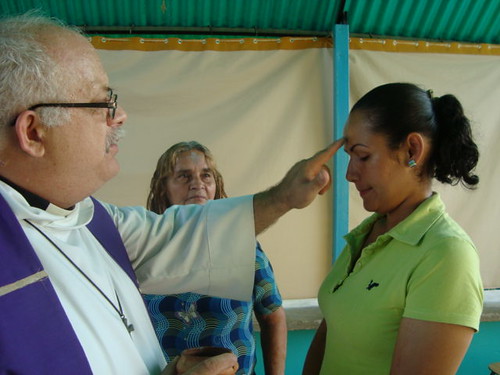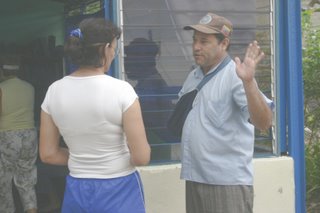
Recently I received by e-mail my electronic copy of Logia, a journal of Lutheran theology. Logia dedicates each quarterly issue to a central theme and advertises its editorial schedule well in advance. So I had been waiting more than a year for the Epipany 2010 issue on Lutheranism in Latin America.
There was a lot of good stuff in the magazine, but what I would like to note is a comment by Dr. Douglas R. Groll, professor emeritus of Concordia Seminary, St. Louis. He described Culto Cristiano, the hymnal whose order of service we follow, as "a fine mid-century Lutheran hymnal considered by many non-Lutherans to be the best Spanish language hymnal of the last century." I share his opinion, but I mention this only to praise Culto Cristiano before criticizing it. But it is only a small criticism.
Culto Cristiano (from Concordia Publishing House) was originally published before the revival of interest among Lutherans in the imposition of ashes to mark the start of Lent. The imposition of ashes basically consists of the pastor using ashes to mark the foreheads of the penitent with a cross while repeating a paraphrase of Genesis, chapter 3, verse 19: "Remember, you are dust and to dust you will return." Dust and ashes are often used interchangeably in the Scriptures as images of mortality (as in Genesis 18:27 or Job 30:19). The ashes also signify repentance as the practice of wearing sackcloth and sprinkling oneself with ashes to express sorrow and/or repentance of sin also dates back to Biblical times.
Of course, the cross symbolizes the hope of forgiveness and redemption in Christ.

Ash Wednesday is named for the rite of imposition of ashes, which seems to have originated in the 12th Century. During the Reformation, Lutherans retained Ash Wednesday as the beginning the 46 days of Lent, but the imposition of ashes ritual fell into disuse, for reasons that are not entirely clear. It certainly is rather odd to celebrate "Ash Wednesday" without the ashes, so perhaps it is not surprising that there has been a revival of the ritual in Lutheran circles, including the Lutheran Church of Venezuela.
But there is no recommended form for this ceremony in Culto Cristiano, so there is no standard practice. For our first Ash Wednesday service in La Caramuca, I led our group in the order of public confession and absolution, followed by the imposition of ashes, then by the order of evening prayer. Fortunately, the lessons provided by the lectionary served very well, for instance, Psalm 51:1-13.
I delivered a brief meditation in which I compared the light of God's holiness to the tropical sun at midday. Standing in that intense light for any length of time without covering might mean death by heat stroke or dehydration, but the light of God's holiness is much more intense than the midday sun. Without the protective covering of Christ's righteousness, it would burn us to ashes. The ashes in the form of a cross remind us that because of Christ's suffering and death on the cross, we may walk in God's pure light, free from the powers of darkness.
With the preschool children, I tried a different approach. I showed them a jar of soil, a jar of ashes left after we burned some leaves and a whole leaf from one of our trees. As long This might take a long time, if the leaf was just covered by other leaves, or a very short time if the leaves were burned. So in some countries, dead bodies are buried in the ground and slowly return to dust, while in other countries the bodies are burned and quickly become ash. Either way it's ashes to ashes, dust to dust. But in Christ we have the promise that one day we all will be restored to life, body and soul. So instead of just dumping human bodies in a landfill, or burning them, we honor the deceased with a burial service that expresses the hope that the body planted in the earth will one day rise again to eternal life.
![Reblog this post [with Zemanta]](http://img.zemanta.com/reblog_e.png?x-id=1c119a09-5fc0-4d14-8ae8-4b9029d1af11)
